Questions 1-16. Write near each schematic diagram the name of the corresponding module:
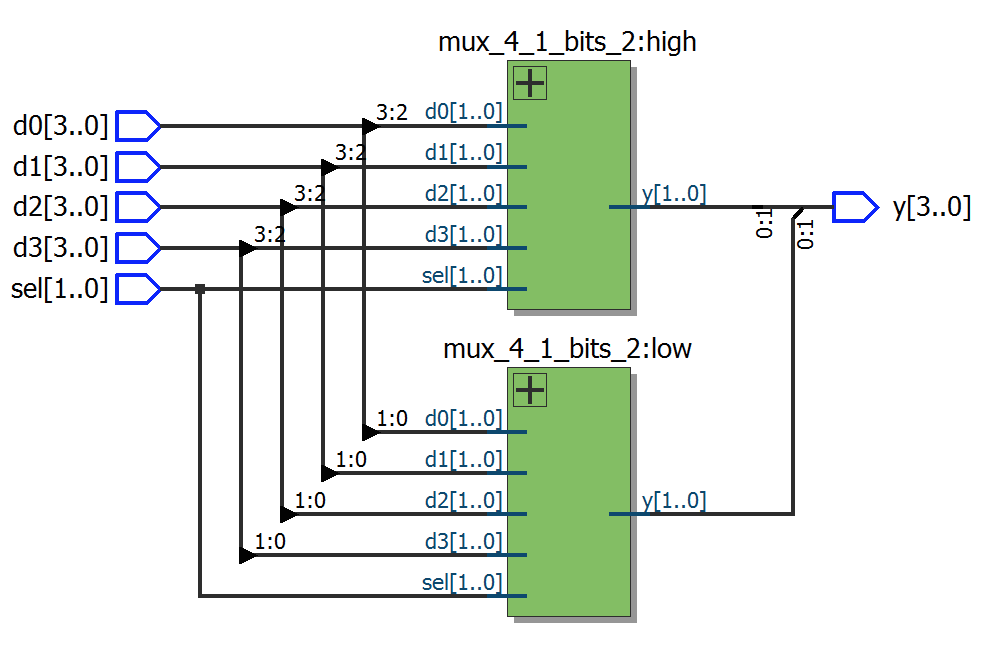
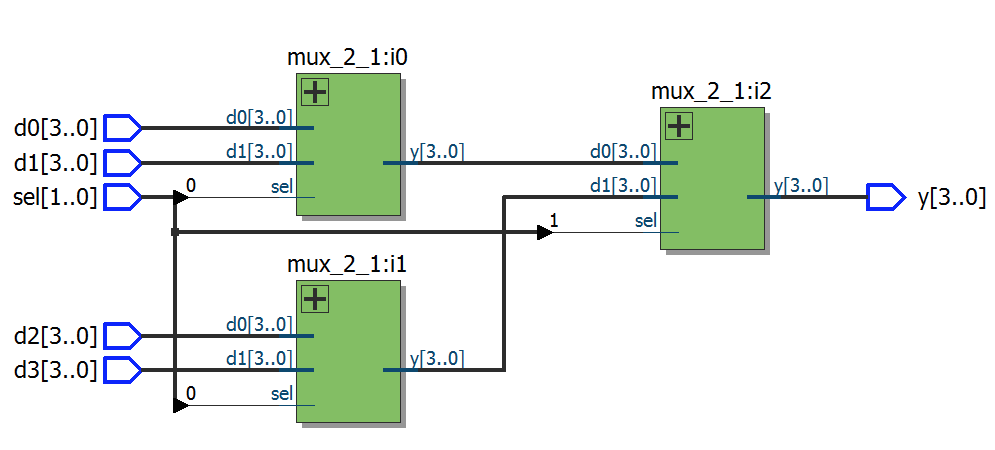

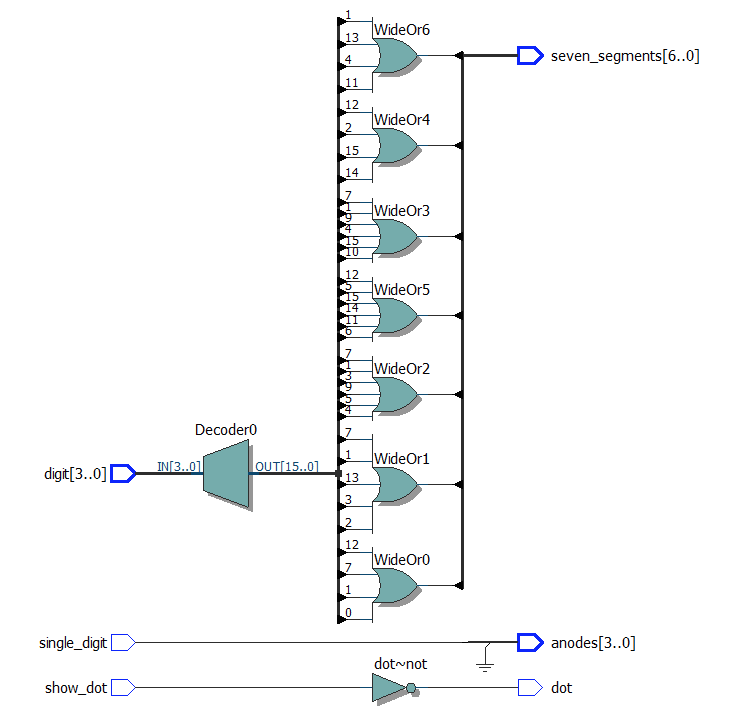


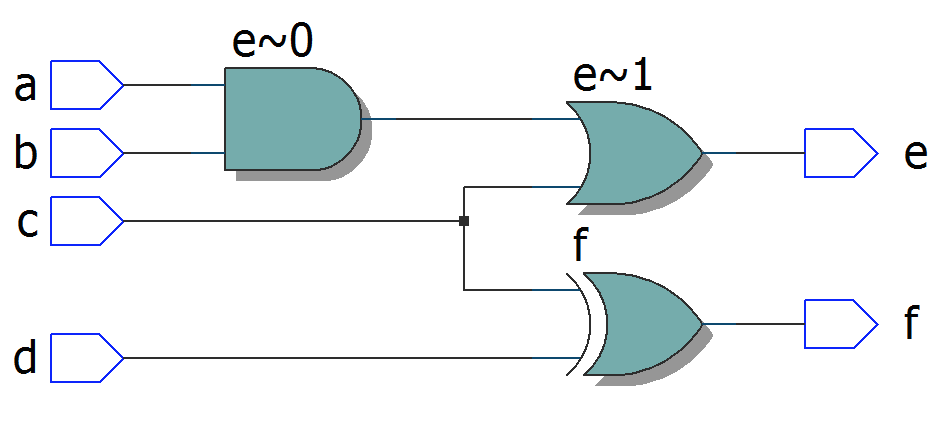
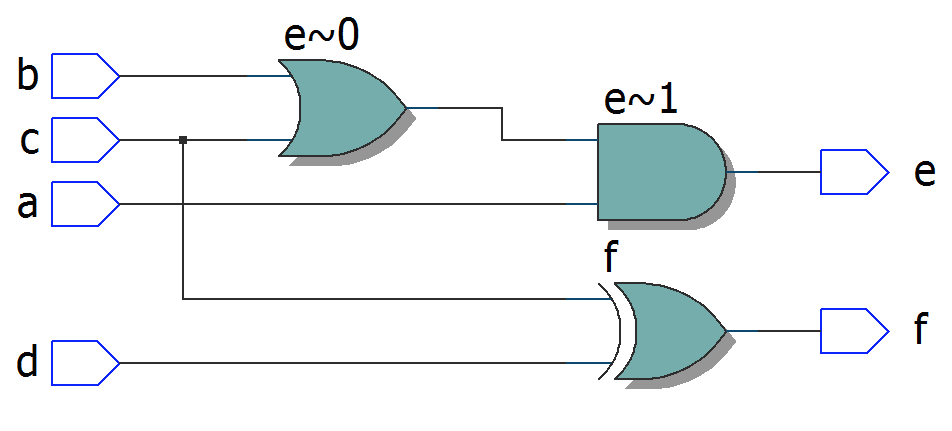
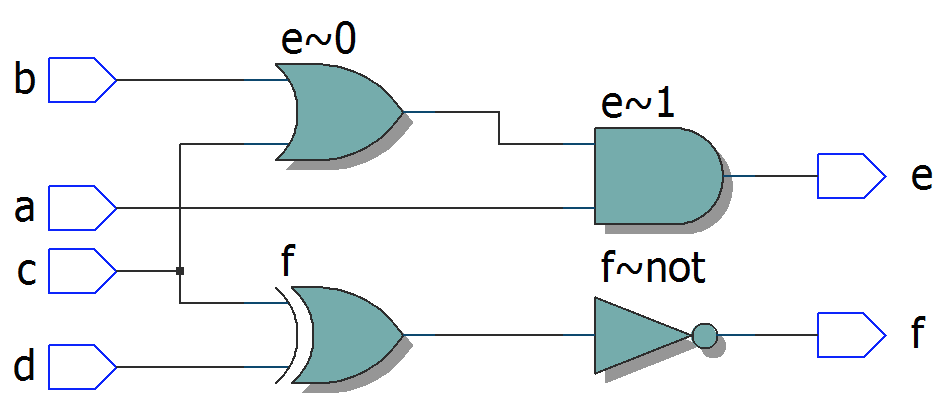

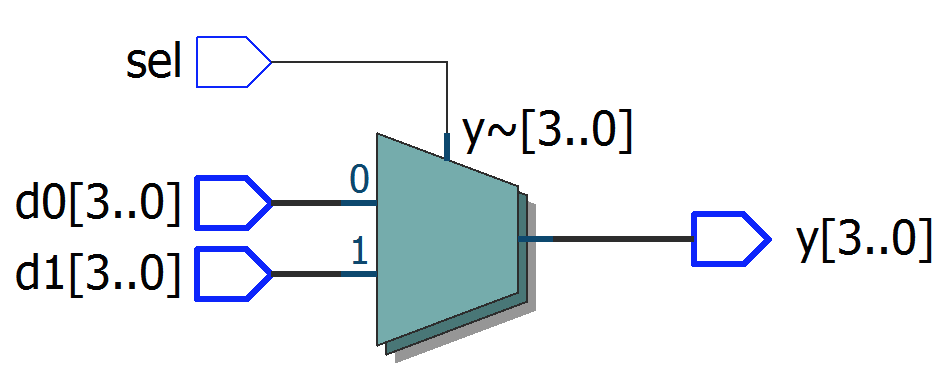
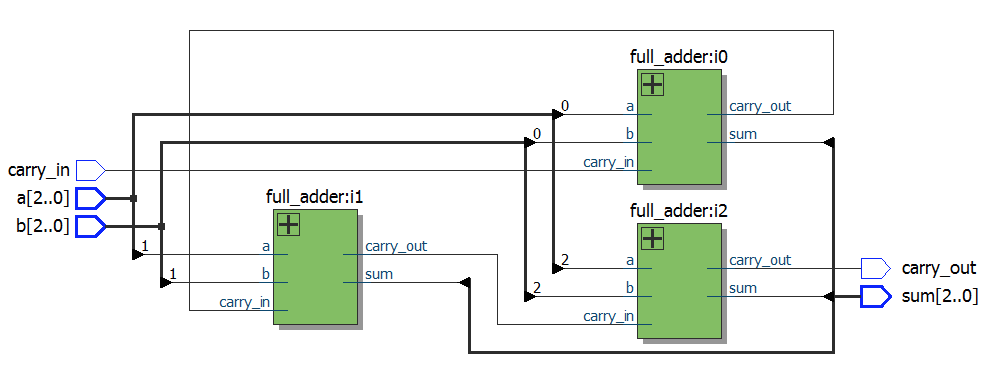
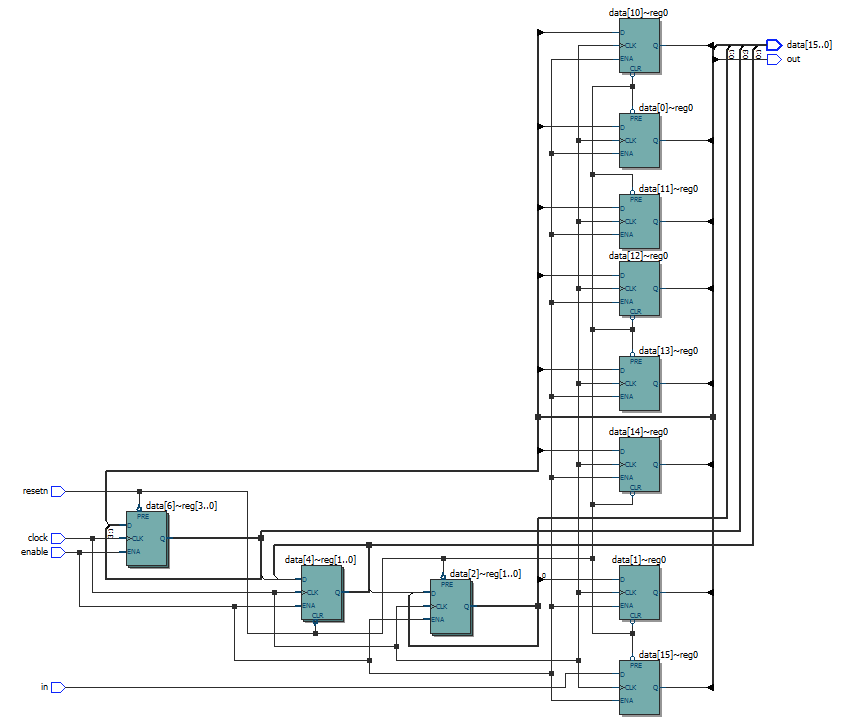
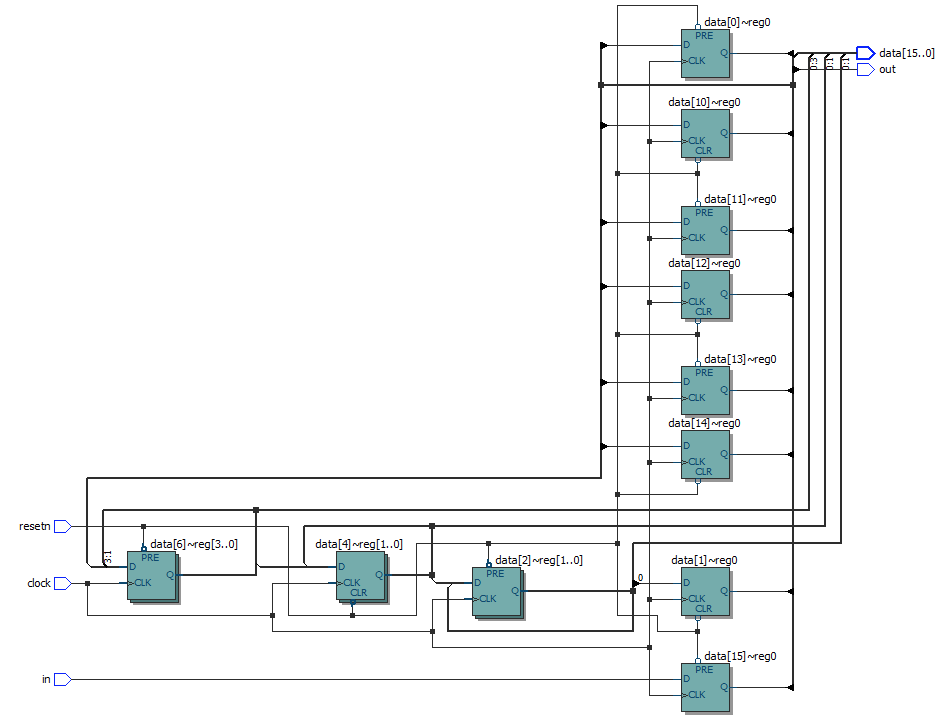
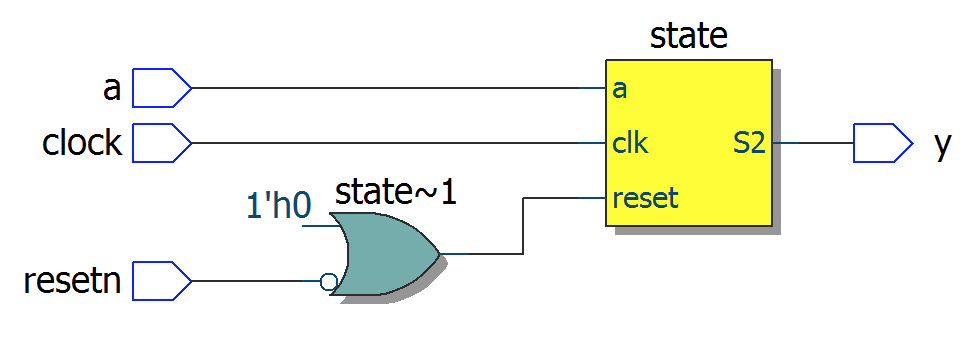
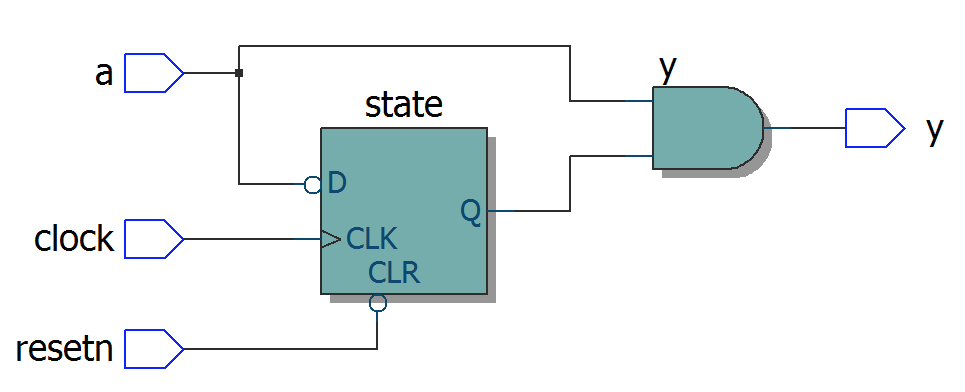 module top1
(
input a,
input b,
input carry_in,
output reg sum,
output reg carry_out
);
reg p, q;
always @*
begin
p = a ^ b;
q = a & b;
sum = p ^ carry_in;
carry_out = q | (p & carry_in);
end
endmodule
module top2
(
input clock,
input resetn,
input a,
output y
);
parameter S0 = 0, S1 = 1;
reg state, next_state;
// state register
always @ (posedge clock or negedge resetn)
if (! resetn)
state <= S0;
else
state <= next_state;
// next state logic
always @*
case (state)
S0:
if (a)
next_state = S0;
else
next_state = S1;
S1:
if (a)
next_state = S0;
else
next_state = S1;
default:
next_state = S0;
endcase
// output logic
assign y = (a & state == S1);
endmodule
module top3
(
input [3:0] digit,
input single_digit,
input show_dot,
output reg [6:0] seven_segments,
output dot,
output [3:0] anodes
);
always @*
case (digit)
'h0: seven_segments = 'b1000000; // a b c d e f g
'h1: seven_segments = 'b1111001;
'h2: seven_segments = 'b0100100; // --a--
'h3: seven_segments = 'b0110000; // | |
'h4: seven_segments = 'b0011001; // f b
'h5: seven_segments = 'b0010010; // | |
'h6: seven_segments = 'b0000010; // --g--
'h7: seven_segments = 'b1111000; // | |
'h8: seven_segments = 'b0000000; // e c
'h9: seven_segments = 'b0011000; // | |
'ha: seven_segments = 'b0001000; // --d--
'hb: seven_segments = 'b0000011;
'hc: seven_segments = 'b1000110;
'hd: seven_segments = 'b0100001;
'he: seven_segments = 'b0000110;
'hf: seven_segments = 'b0001110;
endcase
assign dot = ~ show_dot;
assign anodes = single_digit ? 4'b1110 : 4'b0000;
endmodule
module top4
(
input [2:0] a,
input [2:0] b,
input carry_in,
output [2:0] sum,
output carry_out
);
wire c0, c1;
full_adder i0
(
.a ( a [0] ),
.b ( b [0] ),
.carry_in ( carry_in ),
.sum ( sum [0] ),
.carry_out ( c0 )
);
full_adder i1
(
.a ( a [1] ),
.b ( b [1] ),
.carry_in ( c0 ),
.sum ( sum [1] ),
.carry_out ( c1 )
);
full_adder i2
(
.a ( a [2] ),
.b ( b [2] ),
.carry_in ( c1 ),
.sum ( sum [2] ),
.carry_out ( carry_out )
);
endmodule
module top5
(
input clock,
input resetn,
output reg [15:0] count
);
always @ (posedge clock or negedge resetn)
begin
if (! resetn)
count <= 0;
else
count <= count + 1;
end
endmodule
module top6
(
input clock,
input resetn,
input in,
output out,
output reg [15:0] data
);
always @ (posedge clock or negedge resetn)
begin
if (! resetn)
data <= 16'hABCD;
else
data <= { in, data [15:1] };
// data <= (data >> 1) | (in << 15);
end
assign out = data [0];
endmodule
module top7
(
input clock,
input resetn,
input in,
input enable,
output out,
output reg [15:0] data
);
always @ (posedge clock or negedge resetn)
begin
if (! resetn)
data <= 16'hABCD;
else if (enable)
data <= { in, data [15:1] };
// data <= (data >> 1) | (in << 15);
end
assign out = data [0];
endmodule
module top8
(
input clock,
input resetn,
input a,
output y
);
parameter [1:0] S0 = 0, S1 = 1, S2 = 2;
reg [1:0] state, next_state;
// state register
always @ (posedge clock or negedge resetn)
if (! resetn)
state <= S0;
else
state <= next_state;
// next state logic
always @*
case (state)
S0:
if (a)
next_state = S0;
else
next_state = S1;
S1:
if (a)
next_state = S2;
else
next_state = S1;
S2:
if (a)
next_state = S0;
else
next_state = S1;
default:
next_state = S0;
endcase
// output logic
assign y = (state == S2);
endmodule
module top9
(
input clock,
input resetn,
input load,
input [15:0] load_data,
output reg [15:0] count
);
always @ (posedge clock or negedge resetn)
begin
if (! resetn)
count <= 0;
else if (load)
count <= load_data;
else
count <= count + 1;
end
endmodule
module top10
(
input a, b, c, d,
output e, f
);
assign e = a & (b | c);
assign f = c ^ d;
endmodule
module top11
(
input a, b, c, d,
output e, f
);
assign e = a & b | c;
assign f = c ^ d;
endmodule
module top12
(
input a, b, c, d,
output e, f
);
assign e = a & (b | c);
assign f = ~ (c ^ d);
endmodule
module top13
(
input [3:0] d0,
input [3:0] d1,
input sel,
output [3:0] y
);
assign y = sel ? d1 : d0;
endmodule
module top14
(
input [3:0] d0, d1, d2, d3,
input [1:0] sel,
output [3:0] y
);
wire [3:0] w01, w23;
mux_2_1 i0 (.d0 ( d0 ), .d1 ( d1 ), .sel (sel [0]), .y ( w01 ));
mux_2_1 i1 (.d0 ( d2 ), .d1 ( d3 ), .sel (sel [0]), .y ( w23 ));
mux_2_1 i2 (.d0 ( w01 ), .d1 ( w23 ), .sel (sel [1]), .y ( y ));
endmodule
module top15
(
input [3:0] d0, d1, d2, d3,
input [1:0] sel,
output [3:0] y
);
mux_4_1_bits_2 high
(
.d0 ( d0 [3:2] ),
.d1 ( d1 [3:2] ),
.d2 ( d2 [3:2] ),
.d3 ( d3 [3:2] ),
.sel ( sel ),
.y ( y [3:2] )
);
mux_4_1_bits_2 low
(
.d0 ( d0 [1:0] ),
.d1 ( d1 [1:0] ),
.d2 ( d2 [1:0] ),
.d3 ( d3 [1:0] ),
.sel ( sel ),
.y ( y [1:0] )
);
endmodule
module top16
(
input [2:0] a,
output reg [7:0] y
);
always @*
case (a)
3'b000: y = 8'b00000001;
3'b001: y = 8'b00000010;
3'b010: y = 8'b00000100;
3'b011: y = 8'b00001000;
3'b100: y = 8'b00010000;
3'b101: y = 8'b00100000;
3'b110: y = 8'b01000000;
3'b111: y = 8'b10000000;
endcase
endmodule
Questions 17-21. Write near each state diagram the name of the corresponding module:
module top1
(
input a,
input b,
input carry_in,
output reg sum,
output reg carry_out
);
reg p, q;
always @*
begin
p = a ^ b;
q = a & b;
sum = p ^ carry_in;
carry_out = q | (p & carry_in);
end
endmodule
module top2
(
input clock,
input resetn,
input a,
output y
);
parameter S0 = 0, S1 = 1;
reg state, next_state;
// state register
always @ (posedge clock or negedge resetn)
if (! resetn)
state <= S0;
else
state <= next_state;
// next state logic
always @*
case (state)
S0:
if (a)
next_state = S0;
else
next_state = S1;
S1:
if (a)
next_state = S0;
else
next_state = S1;
default:
next_state = S0;
endcase
// output logic
assign y = (a & state == S1);
endmodule
module top3
(
input [3:0] digit,
input single_digit,
input show_dot,
output reg [6:0] seven_segments,
output dot,
output [3:0] anodes
);
always @*
case (digit)
'h0: seven_segments = 'b1000000; // a b c d e f g
'h1: seven_segments = 'b1111001;
'h2: seven_segments = 'b0100100; // --a--
'h3: seven_segments = 'b0110000; // | |
'h4: seven_segments = 'b0011001; // f b
'h5: seven_segments = 'b0010010; // | |
'h6: seven_segments = 'b0000010; // --g--
'h7: seven_segments = 'b1111000; // | |
'h8: seven_segments = 'b0000000; // e c
'h9: seven_segments = 'b0011000; // | |
'ha: seven_segments = 'b0001000; // --d--
'hb: seven_segments = 'b0000011;
'hc: seven_segments = 'b1000110;
'hd: seven_segments = 'b0100001;
'he: seven_segments = 'b0000110;
'hf: seven_segments = 'b0001110;
endcase
assign dot = ~ show_dot;
assign anodes = single_digit ? 4'b1110 : 4'b0000;
endmodule
module top4
(
input [2:0] a,
input [2:0] b,
input carry_in,
output [2:0] sum,
output carry_out
);
wire c0, c1;
full_adder i0
(
.a ( a [0] ),
.b ( b [0] ),
.carry_in ( carry_in ),
.sum ( sum [0] ),
.carry_out ( c0 )
);
full_adder i1
(
.a ( a [1] ),
.b ( b [1] ),
.carry_in ( c0 ),
.sum ( sum [1] ),
.carry_out ( c1 )
);
full_adder i2
(
.a ( a [2] ),
.b ( b [2] ),
.carry_in ( c1 ),
.sum ( sum [2] ),
.carry_out ( carry_out )
);
endmodule
module top5
(
input clock,
input resetn,
output reg [15:0] count
);
always @ (posedge clock or negedge resetn)
begin
if (! resetn)
count <= 0;
else
count <= count + 1;
end
endmodule
module top6
(
input clock,
input resetn,
input in,
output out,
output reg [15:0] data
);
always @ (posedge clock or negedge resetn)
begin
if (! resetn)
data <= 16'hABCD;
else
data <= { in, data [15:1] };
// data <= (data >> 1) | (in << 15);
end
assign out = data [0];
endmodule
module top7
(
input clock,
input resetn,
input in,
input enable,
output out,
output reg [15:0] data
);
always @ (posedge clock or negedge resetn)
begin
if (! resetn)
data <= 16'hABCD;
else if (enable)
data <= { in, data [15:1] };
// data <= (data >> 1) | (in << 15);
end
assign out = data [0];
endmodule
module top8
(
input clock,
input resetn,
input a,
output y
);
parameter [1:0] S0 = 0, S1 = 1, S2 = 2;
reg [1:0] state, next_state;
// state register
always @ (posedge clock or negedge resetn)
if (! resetn)
state <= S0;
else
state <= next_state;
// next state logic
always @*
case (state)
S0:
if (a)
next_state = S0;
else
next_state = S1;
S1:
if (a)
next_state = S2;
else
next_state = S1;
S2:
if (a)
next_state = S0;
else
next_state = S1;
default:
next_state = S0;
endcase
// output logic
assign y = (state == S2);
endmodule
module top9
(
input clock,
input resetn,
input load,
input [15:0] load_data,
output reg [15:0] count
);
always @ (posedge clock or negedge resetn)
begin
if (! resetn)
count <= 0;
else if (load)
count <= load_data;
else
count <= count + 1;
end
endmodule
module top10
(
input a, b, c, d,
output e, f
);
assign e = a & (b | c);
assign f = c ^ d;
endmodule
module top11
(
input a, b, c, d,
output e, f
);
assign e = a & b | c;
assign f = c ^ d;
endmodule
module top12
(
input a, b, c, d,
output e, f
);
assign e = a & (b | c);
assign f = ~ (c ^ d);
endmodule
module top13
(
input [3:0] d0,
input [3:0] d1,
input sel,
output [3:0] y
);
assign y = sel ? d1 : d0;
endmodule
module top14
(
input [3:0] d0, d1, d2, d3,
input [1:0] sel,
output [3:0] y
);
wire [3:0] w01, w23;
mux_2_1 i0 (.d0 ( d0 ), .d1 ( d1 ), .sel (sel [0]), .y ( w01 ));
mux_2_1 i1 (.d0 ( d2 ), .d1 ( d3 ), .sel (sel [0]), .y ( w23 ));
mux_2_1 i2 (.d0 ( w01 ), .d1 ( w23 ), .sel (sel [1]), .y ( y ));
endmodule
module top15
(
input [3:0] d0, d1, d2, d3,
input [1:0] sel,
output [3:0] y
);
mux_4_1_bits_2 high
(
.d0 ( d0 [3:2] ),
.d1 ( d1 [3:2] ),
.d2 ( d2 [3:2] ),
.d3 ( d3 [3:2] ),
.sel ( sel ),
.y ( y [3:2] )
);
mux_4_1_bits_2 low
(
.d0 ( d0 [1:0] ),
.d1 ( d1 [1:0] ),
.d2 ( d2 [1:0] ),
.d3 ( d3 [1:0] ),
.sel ( sel ),
.y ( y [1:0] )
);
endmodule
module top16
(
input [2:0] a,
output reg [7:0] y
);
always @*
case (a)
3'b000: y = 8'b00000001;
3'b001: y = 8'b00000010;
3'b010: y = 8'b00000100;
3'b011: y = 8'b00001000;
3'b100: y = 8'b00010000;
3'b101: y = 8'b00100000;
3'b110: y = 8'b01000000;
3'b111: y = 8'b10000000;
endcase
endmodule
Questions 17-21. Write near each state diagram the name of the corresponding module:
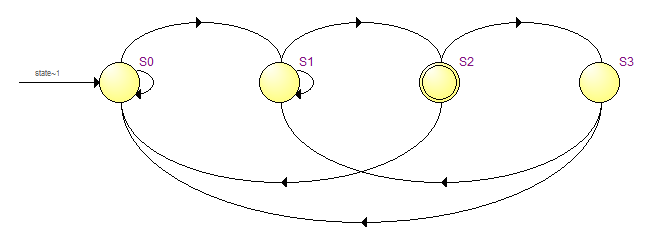
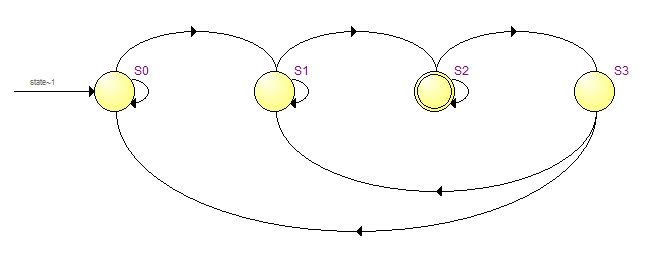
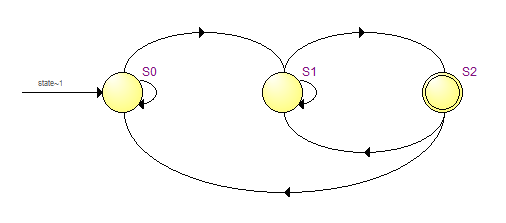
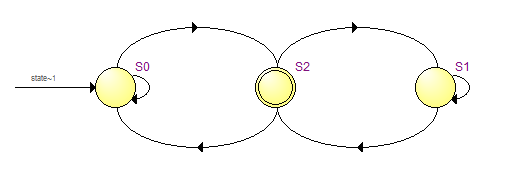
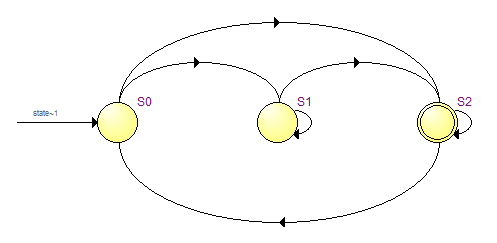 module top17
(
input clock,
input resetn,
input a,
output y
);
parameter [1:0] S0 = 0, S1 = 1, S2 = 2;
reg [1:0] state, next_state;
// state register
always @ (posedge clock or negedge resetn)
if (! resetn)
state <= S0;
else
state <= next_state;
// next state logic
always @*
begin
next_state = state;
case (state)
S0:
if (! a)
next_state = S1;
else
next_state = S2;
S1:
if (a)
next_state = S2;
S2:
if (a)
next_state = S0;
endcase
end
// output logic
assign y = (state == S2);
endmodule
module top18
(
input clock,
input resetn,
input a,
output y
);
parameter [2:0] S0 = 0, S1 = 1, S2 = 2, S3 = 3;
reg [1:0] state, next_state;
// state register
always @ (posedge clock or negedge resetn)
if (! resetn)
state <= S0;
else
state <= next_state;
// next state logic
always @*
begin
next_state = state;
case (state)
S0:
if (! a)
next_state = S1;
S1:
if (a)
next_state = S2;
S2:
if (a)
next_state = S0;
else
next_state = S3;
S3:
if (a)
next_state = S0;
else
next_state = S1;
endcase
end
// output logic
assign y = (state == S2);
endmodule
module top19
(
input clock,
input resetn,
input a,
output y
);
parameter [2:0] S0 = 0, S1 = 1, S2 = 2, S3 = 3;
reg [1:0] state, next_state;
// state register
always @ (posedge clock or negedge resetn)
if (! resetn)
state <= S0;
else
state <= next_state;
// next state logic
always @*
begin
next_state = state;
case (state)
S0:
if (! a)
next_state = S1;
S1:
if (a)
next_state = S2;
S2:
if (a)
next_state = S3;
S3:
if (a)
next_state = S0;
else
next_state = S1;
endcase
end
// output logic
assign y = (state == S2);
endmodule
module top20
(
input clock,
input resetn,
input a,
output y
);
parameter [1:0] S0 = 0, S1 = 1, S2 = 2;
reg [1:0] state, next_state;
// state register
always @ (posedge clock or negedge resetn)
if (! resetn)
state <= S0;
else
state <= next_state;
// next state logic
always @*
begin
next_state = state;
case (state)
S0:
if (! a)
next_state = S1;
S1:
if (a)
next_state = S2;
S2:
if (a)
next_state = S0;
else
next_state = S1;
endcase
end
// output logic
assign y = (state == S2);
endmodule
module top21
(
input clock,
input resetn,
input a,
output y
);
parameter [1:0] S0 = 0, S1 = 1, S2 = 2;
reg [1:0] state, next_state;
// state register
always @ (posedge clock or negedge resetn)
if (! resetn)
state <= S0;
else
state <= next_state;
// next state logic
always @*
begin
next_state = state;
case (state)
S0:
if (! a)
next_state = S2;
S1:
if (a)
next_state = S2;
S2:
if (a)
next_state = S0;
else
next_state = S1;
endcase
end
// output logic
assign y = (state == S2);
endmodule
Questions 22-37. Understanding blocking and non-blocking assignments in SystemVerilog,
combinational and sequential always-blocks, their simulation and synthesis.
For each design under test (dut1-dut16) show the corresponding schematics
and the corresponding waveform:
module dut1 module dut2
( (
input clk, input clk,
input [7:0] d, input [7:0] d,
output logic [7:0] q output logic [7:0] q
); );
always @(posedge clk) always_ff @(posedge clk)
q <= d; q <= d;
endmodule endmodule
module dut3 module dut4
( (
input clk, input clk,
input [7:0] d, input [7:0] d,
output logic [7:0] q output logic [7:0] q
); );
logic [7:0] r; logic [7:0] r;
always @(posedge clk) always @(posedge clk)
begin begin
r <= d; q <= r;
q <= r; r <= d;
end end
endmodule endmodule
module dut5 module dut6
( (
input clk, input clk,
input [7:0] d, input [7:0] d,
output logic [7:0] q output logic [7:0] q
); );
always @* always_comb
q = d; q = d;
endmodule endmodule
module dut7 module dut8
( (
input clk, input clk,
input [7:0] d, input [7:0] d,
output logic [7:0] q output logic [7:0] q
); );
logic [7:0] r; logic [7:0] r;
always @(posedge clk) always @(posedge clk)
r <= d; q <= r;
always @(posedge clk) always @(posedge clk)
q <= r; r <= d;
endmodule endmodule
module dut9 module dut10
( (
input clk, input clk,
input [7:0] d, input [7:0] d,
output logic [7:0] q output logic [7:0] q
); );
logic [7:0] r; logic [7:0] r;
always @* always @(posedge clk)
r = d; q <= r;
always @(posedge clk) always @*
q <= r; r = d;
endmodule endmodule
module dut11 module dut12
( (
input clk, input clk,
input [7:0] d, input [7:0] d,
output logic [7:0] q output logic [7:0] q
); );
logic [7:0] r;
assign r = d; wire [7:0] r = d;
always @(posedge clk) always @(posedge clk)
q <= r; q <= r;
endmodule endmodule
module dut13 module dut14
( (
input clk, input clk,
input [7:0] d, input [7:0] d,
output logic [7:0] q output logic [7:0] q
); );
logic [7:0] r; logic [7:0] r;
assign r = d; assign q = r;
assign q = r; assign r = d;
endmodule endmodule
module dut15_not_a_good_style module dut16_bad_style
( (
input clk, input clk,
input [7:0] d, input [7:0] d,
output logic [7:0] q output logic [7:0] q
); );
logic [7:0] r; logic [7:0] r;
always @(posedge clk) always @(posedge clk)
begin begin
r = d; q <= r;
q <= r; r = d;
end end
endmodule endmodule
The common testbench used to generate the waveforms
module testbench;
logic clk;
logic [7:0] d, q;
dut dut (clk, d, q);
initial
begin
clk = 0;
forever
#10 clk = ! clk;
end
initial
begin
$dumpvars ();
for (int i = 0; i < 10; i++)
begin
@(posedge clk);
#15;
d = i;
end
$finish;
end
endmodule
module top17
(
input clock,
input resetn,
input a,
output y
);
parameter [1:0] S0 = 0, S1 = 1, S2 = 2;
reg [1:0] state, next_state;
// state register
always @ (posedge clock or negedge resetn)
if (! resetn)
state <= S0;
else
state <= next_state;
// next state logic
always @*
begin
next_state = state;
case (state)
S0:
if (! a)
next_state = S1;
else
next_state = S2;
S1:
if (a)
next_state = S2;
S2:
if (a)
next_state = S0;
endcase
end
// output logic
assign y = (state == S2);
endmodule
module top18
(
input clock,
input resetn,
input a,
output y
);
parameter [2:0] S0 = 0, S1 = 1, S2 = 2, S3 = 3;
reg [1:0] state, next_state;
// state register
always @ (posedge clock or negedge resetn)
if (! resetn)
state <= S0;
else
state <= next_state;
// next state logic
always @*
begin
next_state = state;
case (state)
S0:
if (! a)
next_state = S1;
S1:
if (a)
next_state = S2;
S2:
if (a)
next_state = S0;
else
next_state = S3;
S3:
if (a)
next_state = S0;
else
next_state = S1;
endcase
end
// output logic
assign y = (state == S2);
endmodule
module top19
(
input clock,
input resetn,
input a,
output y
);
parameter [2:0] S0 = 0, S1 = 1, S2 = 2, S3 = 3;
reg [1:0] state, next_state;
// state register
always @ (posedge clock or negedge resetn)
if (! resetn)
state <= S0;
else
state <= next_state;
// next state logic
always @*
begin
next_state = state;
case (state)
S0:
if (! a)
next_state = S1;
S1:
if (a)
next_state = S2;
S2:
if (a)
next_state = S3;
S3:
if (a)
next_state = S0;
else
next_state = S1;
endcase
end
// output logic
assign y = (state == S2);
endmodule
module top20
(
input clock,
input resetn,
input a,
output y
);
parameter [1:0] S0 = 0, S1 = 1, S2 = 2;
reg [1:0] state, next_state;
// state register
always @ (posedge clock or negedge resetn)
if (! resetn)
state <= S0;
else
state <= next_state;
// next state logic
always @*
begin
next_state = state;
case (state)
S0:
if (! a)
next_state = S1;
S1:
if (a)
next_state = S2;
S2:
if (a)
next_state = S0;
else
next_state = S1;
endcase
end
// output logic
assign y = (state == S2);
endmodule
module top21
(
input clock,
input resetn,
input a,
output y
);
parameter [1:0] S0 = 0, S1 = 1, S2 = 2;
reg [1:0] state, next_state;
// state register
always @ (posedge clock or negedge resetn)
if (! resetn)
state <= S0;
else
state <= next_state;
// next state logic
always @*
begin
next_state = state;
case (state)
S0:
if (! a)
next_state = S2;
S1:
if (a)
next_state = S2;
S2:
if (a)
next_state = S0;
else
next_state = S1;
endcase
end
// output logic
assign y = (state == S2);
endmodule
Questions 22-37. Understanding blocking and non-blocking assignments in SystemVerilog,
combinational and sequential always-blocks, their simulation and synthesis.
For each design under test (dut1-dut16) show the corresponding schematics
and the corresponding waveform:
module dut1 module dut2
( (
input clk, input clk,
input [7:0] d, input [7:0] d,
output logic [7:0] q output logic [7:0] q
); );
always @(posedge clk) always_ff @(posedge clk)
q <= d; q <= d;
endmodule endmodule
module dut3 module dut4
( (
input clk, input clk,
input [7:0] d, input [7:0] d,
output logic [7:0] q output logic [7:0] q
); );
logic [7:0] r; logic [7:0] r;
always @(posedge clk) always @(posedge clk)
begin begin
r <= d; q <= r;
q <= r; r <= d;
end end
endmodule endmodule
module dut5 module dut6
( (
input clk, input clk,
input [7:0] d, input [7:0] d,
output logic [7:0] q output logic [7:0] q
); );
always @* always_comb
q = d; q = d;
endmodule endmodule
module dut7 module dut8
( (
input clk, input clk,
input [7:0] d, input [7:0] d,
output logic [7:0] q output logic [7:0] q
); );
logic [7:0] r; logic [7:0] r;
always @(posedge clk) always @(posedge clk)
r <= d; q <= r;
always @(posedge clk) always @(posedge clk)
q <= r; r <= d;
endmodule endmodule
module dut9 module dut10
( (
input clk, input clk,
input [7:0] d, input [7:0] d,
output logic [7:0] q output logic [7:0] q
); );
logic [7:0] r; logic [7:0] r;
always @* always @(posedge clk)
r = d; q <= r;
always @(posedge clk) always @*
q <= r; r = d;
endmodule endmodule
module dut11 module dut12
( (
input clk, input clk,
input [7:0] d, input [7:0] d,
output logic [7:0] q output logic [7:0] q
); );
logic [7:0] r;
assign r = d; wire [7:0] r = d;
always @(posedge clk) always @(posedge clk)
q <= r; q <= r;
endmodule endmodule
module dut13 module dut14
( (
input clk, input clk,
input [7:0] d, input [7:0] d,
output logic [7:0] q output logic [7:0] q
); );
logic [7:0] r; logic [7:0] r;
assign r = d; assign q = r;
assign q = r; assign r = d;
endmodule endmodule
module dut15_not_a_good_style module dut16_bad_style
( (
input clk, input clk,
input [7:0] d, input [7:0] d,
output logic [7:0] q output logic [7:0] q
); );
logic [7:0] r; logic [7:0] r;
always @(posedge clk) always @(posedge clk)
begin begin
r = d; q <= r;
q <= r; r = d;
end end
endmodule endmodule
The common testbench used to generate the waveforms
module testbench;
logic clk;
logic [7:0] d, q;
dut dut (clk, d, q);
initial
begin
clk = 0;
forever
#10 clk = ! clk;
end
initial
begin
$dumpvars ();
for (int i = 0; i < 10; i++)
begin
@(posedge clk);
#15;
d = i;
end
$finish;
end
endmodule
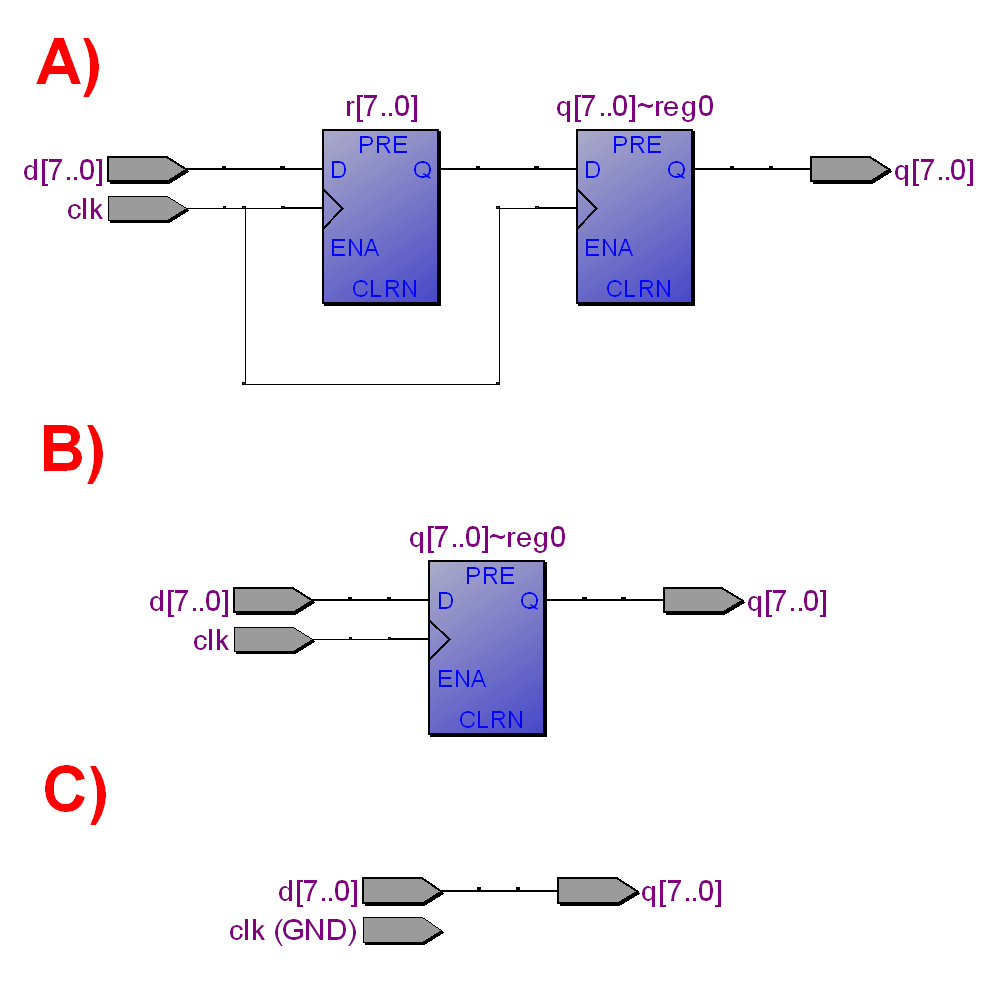
X)

Y)

Z)
 Questions 38-42. Write near each program the corresponding memory contents after its execution:
Program 38:
Questions 38-42. Write near each program the corresponding memory contents after its execution:
Program 38:
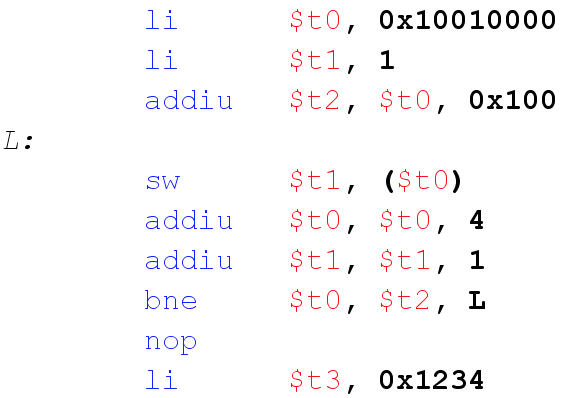 Program 39:
Program 39:
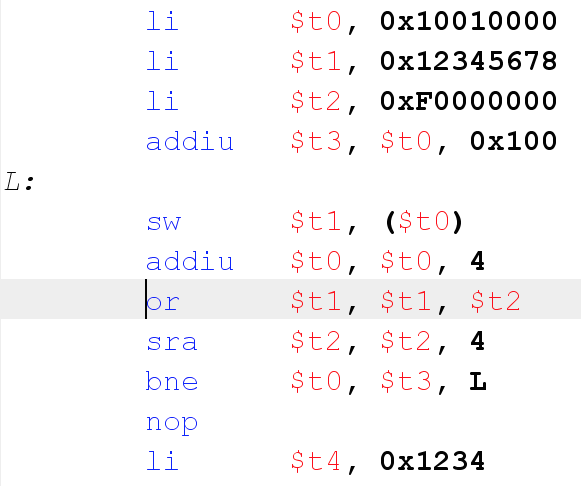 Program 40:
Program 40:
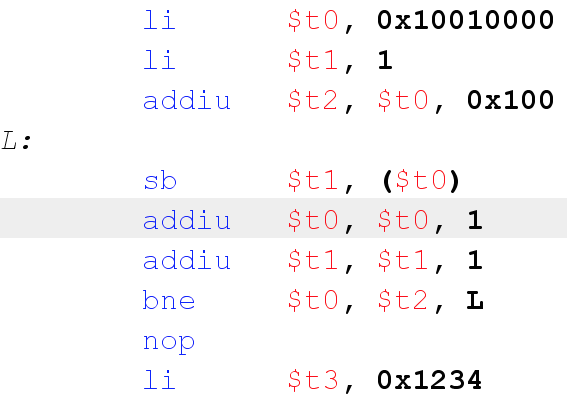 Program 41:
Program 41:
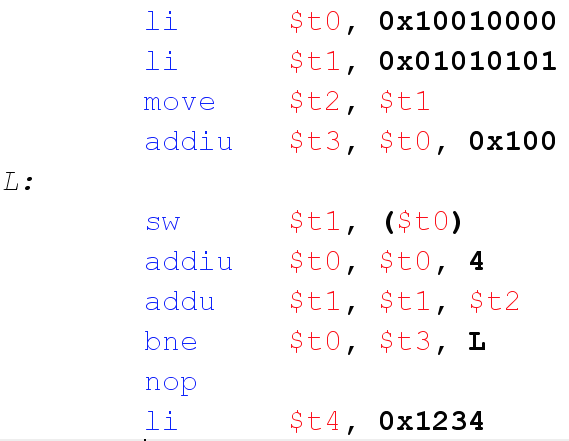 Program 42:
Program 42:
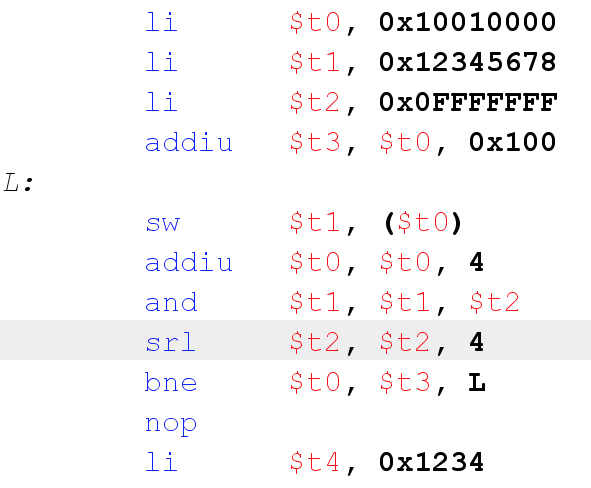 Memory 1:
Memory 1:
 Memory 2:
Memory 2:
 Memory 3:
Memory 3:
 Memory 4:
Memory 4:
 Memory 5:
Memory 5:




 Questions 38-42. Write near each program the corresponding memory contents after its execution:
Program 38:
Questions 38-42. Write near each program the corresponding memory contents after its execution:
Program 38:







module top1 ( input a, input b, input carry_in, output reg sum, output reg carry_out ); reg p, q; always @* begin p = a ^ b; q = a & b; sum = p ^ carry_in; carry_out = q | (p & carry_in); end endmodule module top2 ( input clock, input resetn, input a, output y ); parameter S0 = 0, S1 = 1; reg state, next_state; // state register always @ (posedge clock or negedge resetn) if (! resetn) state <= S0; else state <= next_state; // next state logic always @* case (state) S0: if (a) next_state = S0; else next_state = S1; S1: if (a) next_state = S0; else next_state = S1; default: next_state = S0; endcase // output logic assign y = (a & state == S1); endmodule module top3 ( input [3:0] digit, input single_digit, input show_dot, output reg [6:0] seven_segments, output dot, output [3:0] anodes ); always @* case (digit) 'h0: seven_segments = 'b1000000; // a b c d e f g 'h1: seven_segments = 'b1111001; 'h2: seven_segments = 'b0100100; // --a-- 'h3: seven_segments = 'b0110000; // | | 'h4: seven_segments = 'b0011001; // f b 'h5: seven_segments = 'b0010010; // | | 'h6: seven_segments = 'b0000010; // --g-- 'h7: seven_segments = 'b1111000; // | | 'h8: seven_segments = 'b0000000; // e c 'h9: seven_segments = 'b0011000; // | | 'ha: seven_segments = 'b0001000; // --d-- 'hb: seven_segments = 'b0000011; 'hc: seven_segments = 'b1000110; 'hd: seven_segments = 'b0100001; 'he: seven_segments = 'b0000110; 'hf: seven_segments = 'b0001110; endcase assign dot = ~ show_dot; assign anodes = single_digit ? 4'b1110 : 4'b0000; endmodule module top4 ( input [2:0] a, input [2:0] b, input carry_in, output [2:0] sum, output carry_out ); wire c0, c1; full_adder i0 ( .a ( a [0] ), .b ( b [0] ), .carry_in ( carry_in ), .sum ( sum [0] ), .carry_out ( c0 ) ); full_adder i1 ( .a ( a [1] ), .b ( b [1] ), .carry_in ( c0 ), .sum ( sum [1] ), .carry_out ( c1 ) ); full_adder i2 ( .a ( a [2] ), .b ( b [2] ), .carry_in ( c1 ), .sum ( sum [2] ), .carry_out ( carry_out ) ); endmodule module top5 ( input clock, input resetn, output reg [15:0] count ); always @ (posedge clock or negedge resetn) begin if (! resetn) count <= 0; else count <= count + 1; end endmodule module top6 ( input clock, input resetn, input in, output out, output reg [15:0] data ); always @ (posedge clock or negedge resetn) begin if (! resetn) data <= 16'hABCD; else data <= { in, data [15:1] }; // data <= (data >> 1) | (in << 15); end assign out = data [0]; endmodule module top7 ( input clock, input resetn, input in, input enable, output out, output reg [15:0] data ); always @ (posedge clock or negedge resetn) begin if (! resetn) data <= 16'hABCD; else if (enable) data <= { in, data [15:1] }; // data <= (data >> 1) | (in << 15); end assign out = data [0]; endmodule module top8 ( input clock, input resetn, input a, output y ); parameter [1:0] S0 = 0, S1 = 1, S2 = 2; reg [1:0] state, next_state; // state register always @ (posedge clock or negedge resetn) if (! resetn) state <= S0; else state <= next_state; // next state logic always @* case (state) S0: if (a) next_state = S0; else next_state = S1; S1: if (a) next_state = S2; else next_state = S1; S2: if (a) next_state = S0; else next_state = S1; default: next_state = S0; endcase // output logic assign y = (state == S2); endmodule module top9 ( input clock, input resetn, input load, input [15:0] load_data, output reg [15:0] count ); always @ (posedge clock or negedge resetn) begin if (! resetn) count <= 0; else if (load) count <= load_data; else count <= count + 1; end endmodule module top10 ( input a, b, c, d, output e, f ); assign e = a & (b | c); assign f = c ^ d; endmodule module top11 ( input a, b, c, d, output e, f ); assign e = a & b | c; assign f = c ^ d; endmodule module top12 ( input a, b, c, d, output e, f ); assign e = a & (b | c); assign f = ~ (c ^ d); endmodule module top13 ( input [3:0] d0, input [3:0] d1, input sel, output [3:0] y ); assign y = sel ? d1 : d0; endmodule module top14 ( input [3:0] d0, d1, d2, d3, input [1:0] sel, output [3:0] y ); wire [3:0] w01, w23; mux_2_1 i0 (.d0 ( d0 ), .d1 ( d1 ), .sel (sel [0]), .y ( w01 )); mux_2_1 i1 (.d0 ( d2 ), .d1 ( d3 ), .sel (sel [0]), .y ( w23 )); mux_2_1 i2 (.d0 ( w01 ), .d1 ( w23 ), .sel (sel [1]), .y ( y )); endmodule module top15 ( input [3:0] d0, d1, d2, d3, input [1:0] sel, output [3:0] y ); mux_4_1_bits_2 high ( .d0 ( d0 [3:2] ), .d1 ( d1 [3:2] ), .d2 ( d2 [3:2] ), .d3 ( d3 [3:2] ), .sel ( sel ), .y ( y [3:2] ) ); mux_4_1_bits_2 low ( .d0 ( d0 [1:0] ), .d1 ( d1 [1:0] ), .d2 ( d2 [1:0] ), .d3 ( d3 [1:0] ), .sel ( sel ), .y ( y [1:0] ) ); endmodule module top16 ( input [2:0] a, output reg [7:0] y ); always @* case (a) 3'b000: y = 8'b00000001; 3'b001: y = 8'b00000010; 3'b010: y = 8'b00000100; 3'b011: y = 8'b00001000; 3'b100: y = 8'b00010000; 3'b101: y = 8'b00100000; 3'b110: y = 8'b01000000; 3'b111: y = 8'b10000000; endcase endmodule Questions 17-21. Write near each state diagram the name of the corresponding module:

module top17 ( input clock, input resetn, input a, output y ); parameter [1:0] S0 = 0, S1 = 1, S2 = 2; reg [1:0] state, next_state; // state register always @ (posedge clock or negedge resetn) if (! resetn) state <= S0; else state <= next_state; // next state logic always @* begin next_state = state; case (state) S0: if (! a) next_state = S1; else next_state = S2; S1: if (a) next_state = S2; S2: if (a) next_state = S0; endcase end // output logic assign y = (state == S2); endmodule module top18 ( input clock, input resetn, input a, output y ); parameter [2:0] S0 = 0, S1 = 1, S2 = 2, S3 = 3; reg [1:0] state, next_state; // state register always @ (posedge clock or negedge resetn) if (! resetn) state <= S0; else state <= next_state; // next state logic always @* begin next_state = state; case (state) S0: if (! a) next_state = S1; S1: if (a) next_state = S2; S2: if (a) next_state = S0; else next_state = S3; S3: if (a) next_state = S0; else next_state = S1; endcase end // output logic assign y = (state == S2); endmodule module top19 ( input clock, input resetn, input a, output y ); parameter [2:0] S0 = 0, S1 = 1, S2 = 2, S3 = 3; reg [1:0] state, next_state; // state register always @ (posedge clock or negedge resetn) if (! resetn) state <= S0; else state <= next_state; // next state logic always @* begin next_state = state; case (state) S0: if (! a) next_state = S1; S1: if (a) next_state = S2; S2: if (a) next_state = S3; S3: if (a) next_state = S0; else next_state = S1; endcase end // output logic assign y = (state == S2); endmodule module top20 ( input clock, input resetn, input a, output y ); parameter [1:0] S0 = 0, S1 = 1, S2 = 2; reg [1:0] state, next_state; // state register always @ (posedge clock or negedge resetn) if (! resetn) state <= S0; else state <= next_state; // next state logic always @* begin next_state = state; case (state) S0: if (! a) next_state = S1; S1: if (a) next_state = S2; S2: if (a) next_state = S0; else next_state = S1; endcase end // output logic assign y = (state == S2); endmodule module top21 ( input clock, input resetn, input a, output y ); parameter [1:0] S0 = 0, S1 = 1, S2 = 2; reg [1:0] state, next_state; // state register always @ (posedge clock or negedge resetn) if (! resetn) state <= S0; else state <= next_state; // next state logic always @* begin next_state = state; case (state) S0: if (! a) next_state = S2; S1: if (a) next_state = S2; S2: if (a) next_state = S0; else next_state = S1; endcase end // output logic assign y = (state == S2); endmodule Questions 22-37. Understanding blocking and non-blocking assignments in SystemVerilog, combinational and sequential always-blocks, their simulation and synthesis. For each design under test (dut1-dut16) show the corresponding schematics and the corresponding waveform: module dut1 module dut2 ( ( input clk, input clk, input [7:0] d, input [7:0] d, output logic [7:0] q output logic [7:0] q ); ); always @(posedge clk) always_ff @(posedge clk) q <= d; q <= d; endmodule endmodule module dut3 module dut4 ( ( input clk, input clk, input [7:0] d, input [7:0] d, output logic [7:0] q output logic [7:0] q ); ); logic [7:0] r; logic [7:0] r; always @(posedge clk) always @(posedge clk) begin begin r <= d; q <= r; q <= r; r <= d; end end endmodule endmodule module dut5 module dut6 ( ( input clk, input clk, input [7:0] d, input [7:0] d, output logic [7:0] q output logic [7:0] q ); ); always @* always_comb q = d; q = d; endmodule endmodule module dut7 module dut8 ( ( input clk, input clk, input [7:0] d, input [7:0] d, output logic [7:0] q output logic [7:0] q ); ); logic [7:0] r; logic [7:0] r; always @(posedge clk) always @(posedge clk) r <= d; q <= r; always @(posedge clk) always @(posedge clk) q <= r; r <= d; endmodule endmodule module dut9 module dut10 ( ( input clk, input clk, input [7:0] d, input [7:0] d, output logic [7:0] q output logic [7:0] q ); ); logic [7:0] r; logic [7:0] r; always @* always @(posedge clk) r = d; q <= r; always @(posedge clk) always @* q <= r; r = d; endmodule endmodule module dut11 module dut12 ( ( input clk, input clk, input [7:0] d, input [7:0] d, output logic [7:0] q output logic [7:0] q ); ); logic [7:0] r; assign r = d; wire [7:0] r = d; always @(posedge clk) always @(posedge clk) q <= r; q <= r; endmodule endmodule module dut13 module dut14 ( ( input clk, input clk, input [7:0] d, input [7:0] d, output logic [7:0] q output logic [7:0] q ); ); logic [7:0] r; logic [7:0] r; assign r = d; assign q = r; assign q = r; assign r = d; endmodule endmodule module dut15_not_a_good_style module dut16_bad_style ( ( input clk, input clk, input [7:0] d, input [7:0] d, output logic [7:0] q output logic [7:0] q ); ); logic [7:0] r; logic [7:0] r; always @(posedge clk) always @(posedge clk) begin begin r = d; q <= r; q <= r; r = d; end end endmodule endmodule The common testbench used to generate the waveforms module testbench; logic clk; logic [7:0] d, q; dut dut (clk, d, q); initial begin clk = 0; forever #10 clk = ! clk; end initial begin $dumpvars (); for (int i = 0; i < 10; i++) begin @(posedge clk); #15; d = i; end $finish; end endmodule



Questions 38-42. Write near each program the corresponding memory contents after its execution: Program 38:
Program 39:
Program 40:
Program 41:
Program 42:
Memory 1:
Memory 2:
Memory 3:
Memory 4:
Memory 5:
